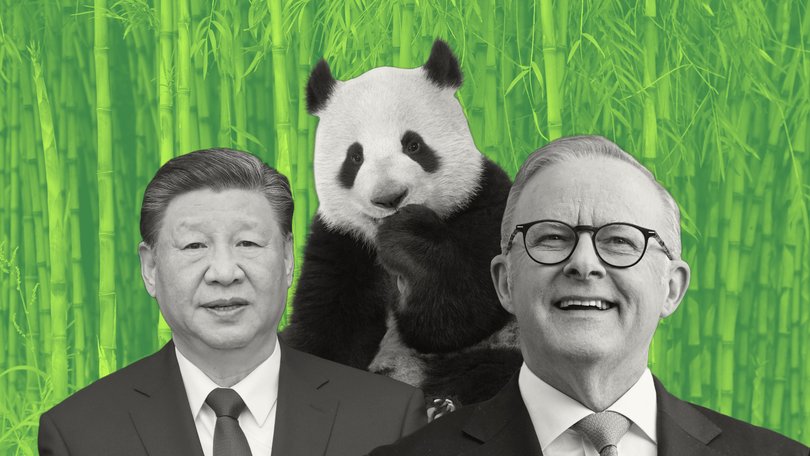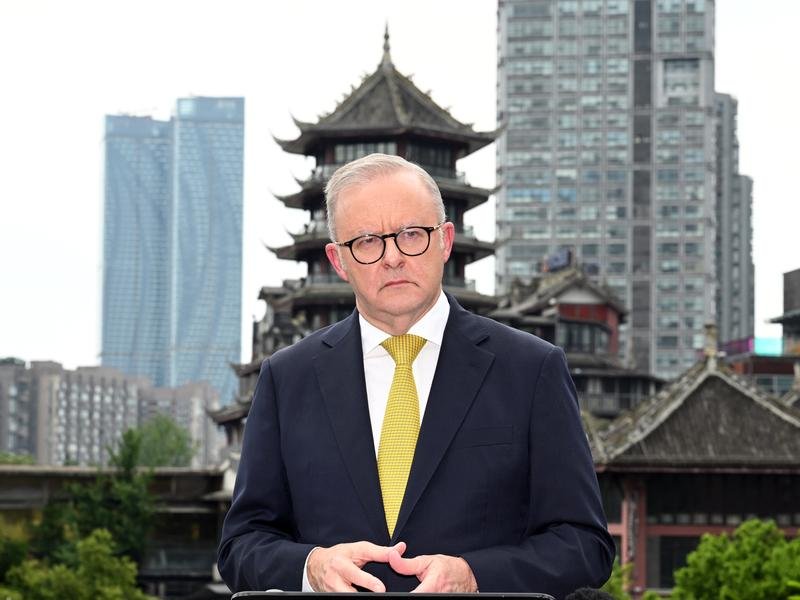NICOLA SMITH: History will judge if Albo’s pandering to Chinese was the right approach
NICOLA SMITH: In the shifting sands of a rapidly changing world, time will tell if Mr Albanese has struck the right tone with the Chinese leadership.

Bob Hawke’s memorable discomfort while hugging a restless giant panda cub in his arms in 1986 was a moment denied this week to Anthony Albanese who had to make do with admiring the bamboo-munching bears from the other side of their walled enclosure.
Animal welfare rules have drastically changed alongside the increasingly unstable geopolitical environment since one of the high points in bilateral relations during the Hawke era China trip four decades ago.
“The world is different. The role of a leader is to adjust to the world as it is, rather than as you would like it to be,” Mr Albanese said while walking in the footsteps of another Labor giant, Gough Whitlam on the Great Wall of China.
Sign up to The Nightly's newsletters.
Get the first look at the digital newspaper, curated daily stories and breaking headlines delivered to your inbox.
By continuing you agree to our Terms and Privacy Policy.“China has a different political system from us … that means that we do have differences.
“What’s important is that we’re able to talk about those differences, to talk about them wisely and to acknowledge that they’re there, but to not allow those differences to define us.”
Mr Whitlam paved the way for Australia’s modern day relations with Beijing by making the bold move to establish formal diplomatic ties with the People’s Republic of China in 1972, pivoting away from the Republic of China in Taiwan.
Mr Albanese now wants to put his own soft power imprint on Australia’s evolving relationship with China.
He promotes respect, personal relationships and thriving trade as the best buffer against the current geopolitical churn.
In the shifting sands of a rapidly changing world, time will tell if Mr Albanese has struck the right tone with the Chinese leadership but his six-day tour has already generated a divided response at home.
Former home affairs secretary Mike Pezzullo struck a chilling note of caution on the Prime Minister’s approach.
“History will judge whether six days in China was worth the return. The same effect could have been achieved with a day of high-level meetings in Beijing, followed by a dinner,” he said.
“The other days could have been better spent in Tokyo, Seoul, and Manila.
“If, tragically, war erupts in a year or so, this visit will be seen forever in a very different light.”
Jennifer Parker, an expert associate at the ANU’s national security college, said the trip looked positive from an economic and diplomatic standpoint, but was disappointed the Prime Minister had not made an issue of ADF personnel being harassed in the South China Sea and North East Asia.
“Given how dangerous this is I would have liked to see it raised,” she said.
Ms Parker said she was surprised more had not been conveyed by the US about the trip.
“I think in the broad they would see the trip as positive, rumours are Trump will go there later this year. However, I suspect they will wish a more robust security conversation was had,” she said.
Mr Albanese began his Tour of China with a pitch to deepen the two nations’ economic bond and explore the potential of green energy cooperation against the backdrop of Shanghai’s jawdropping skyline.

He was then welcomed with pomp, ceremony and a private lunch invitation with fiancee Jodie Haydon in an ornate banquet room in the imposing Great Hall of the People, built to impress top dignitaries visiting Beijing.
China and its leadership turned on their full charms - staggering architecture, stunning industrial development, a world-beating renewables sector and adorable panda antics to round off the week.
But the country is ruled by the same government that squeezed the democratic life out of Hong Kong, threatens to invade Taiwan and regularly intimidates rival claimants over strategic features, islands and reefs in the South China Sea.
It is the same Communist regime that turned off the trade taps as a coercive measure when the Morrison government demanded a Covid-19 inquiry, and which handed imprisoned Australian writer Yang Hengchun a suspended death sentence despite Canberra’s protests.
Australia’s biggest trading partner is its largest defence partner’s strategic nemesis and there is no obvious way to reconcile the two.
Managing relations with China is a diplomatic quickstep and nobody knows when the music will stop and the good times end.
For now, Mr Albanese has bet on soft power over diplomatic muscle-flexing as the favoured strategy to maintain regional peace while also creating jobs.
As he wrapped up his tour on Thursday, the Prime Minister batted away Opposition suggestions his trip, and Great Wall excursion, had been “indulgent.”
He argued pictures from the Great Wall had the potential to reach over a billion Chinese.
“And those billion people represent people who are increasingly rising up the income ladder and are potential tourists and therefore job creators in Australia,” Mr Albanese said.
“The Great Wall of China symbolizes the extraordinary history and culture here in China and showing a bit of respect to people never cost anything.”
Professor James Curran from the University of Sydney said the Prime Minister had not backed away from raising sensitive issues in private, including the case of Mr Yang and contesting the lack of notice when the Chinese Navy conducted live-fire exercises off the Australian coast.
“There’s a name for this: it’s called diplomacy. Some observers in Australia, though, will clearly not be happy unless the PM goes to Beijing with all guns blazing, looking to pick a fight,” he said.
“But the idea this country returns to the guileless, megaphone diplomacy of the Morrison government is breathtaking.
“Our efforts should be squarely aimed at dialogue - straight and direct when it needs to be- as a means of building a cooperative climate for peace in the region.”
Mr Albanese is not alone in grappling with the complexities of relations with China.
US President Donald Trump has toned down his confrontational tone with China over Washington’s trade deficit with Beijing while seeking a deal and to lock in a summit with President Xi, according to a Bloomberg report.
China has also been recalibrating its approach to Australia.
Although state media articles raised the overturning of a 99-year lease granted to the Beijing-controlled Landbridge group for the strategic port of Darwin as a potential hurdle, Mr Xi and Premier Li Qiang refrained from directly pressing the Prime Minister on the issue.
Mr Xi said on Wednesday the China-Australia relationship had risen from “setbacks” and turned around.
Chairman Zhao Leji, the third highest politician in China, and who has accepted an invite to Australia, said the “productive” meeting between Mr Albanese and President Xi had outlined “a new blueprint for the China Australia relationship.”
China’s leadership paid close attention to detail in courting Mr Albanese, regaling him over banquets with Chinese folk music by the People’s Liberation Army military band and covers of Paul Kelly’s ‘To Her Door’ and Midnight Oil’s Power and the Passion.
During his Wednesday evening stroll along the Jinjiang River in central Chengdu, the cheerful demeanour of Chinese Ambassador to Australia, Xiao Qian, illustrated China believes the trip has gone well.
For Australia it is too soon to tell if Mr Albanese’s gamble will pay off.

